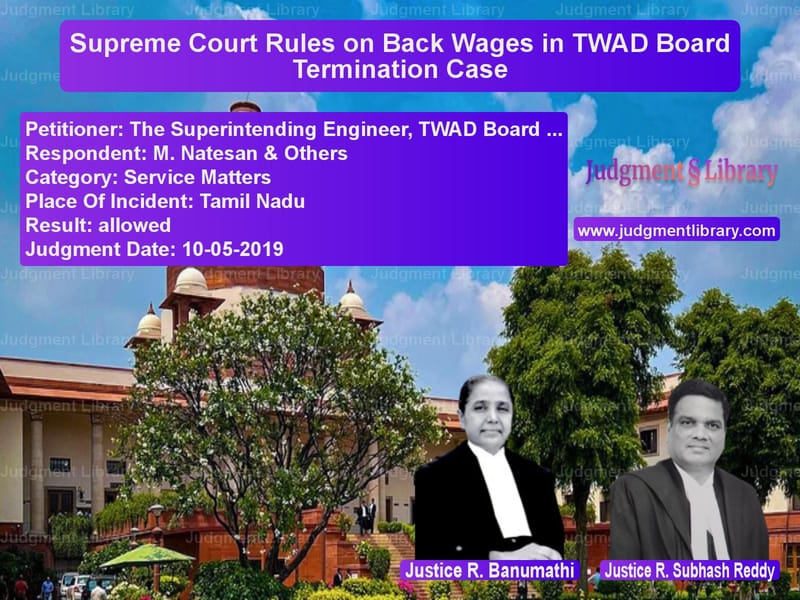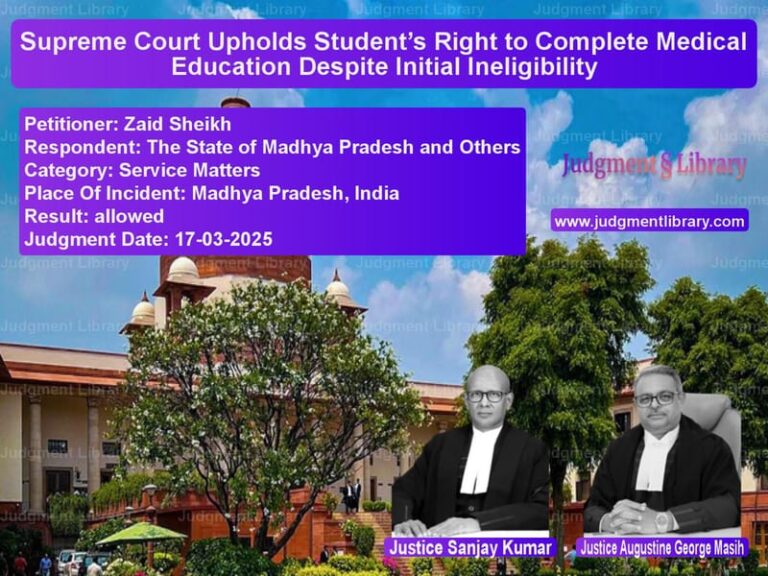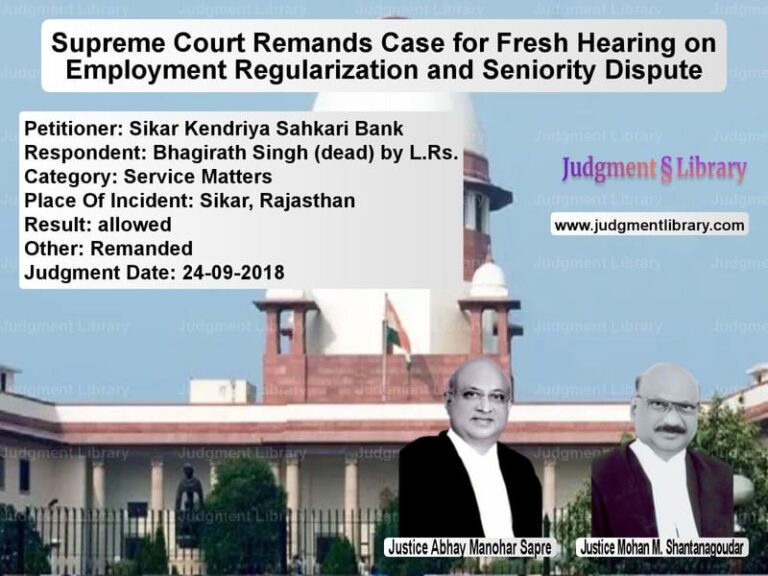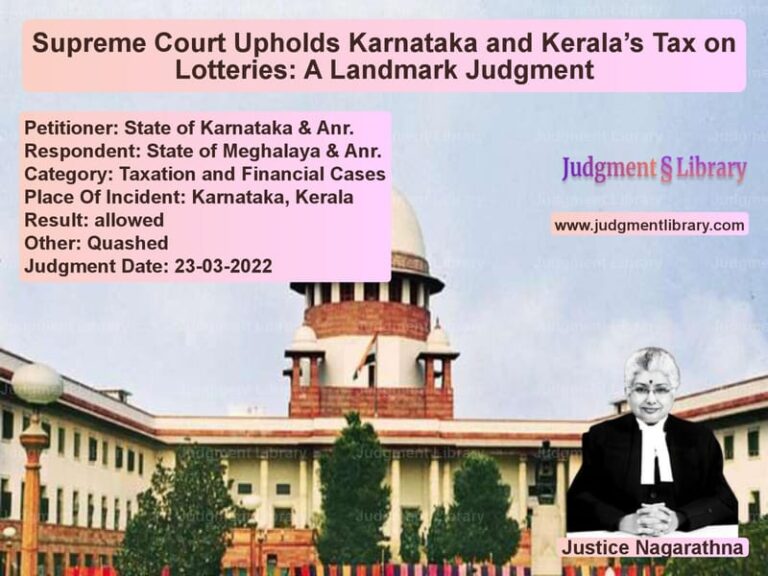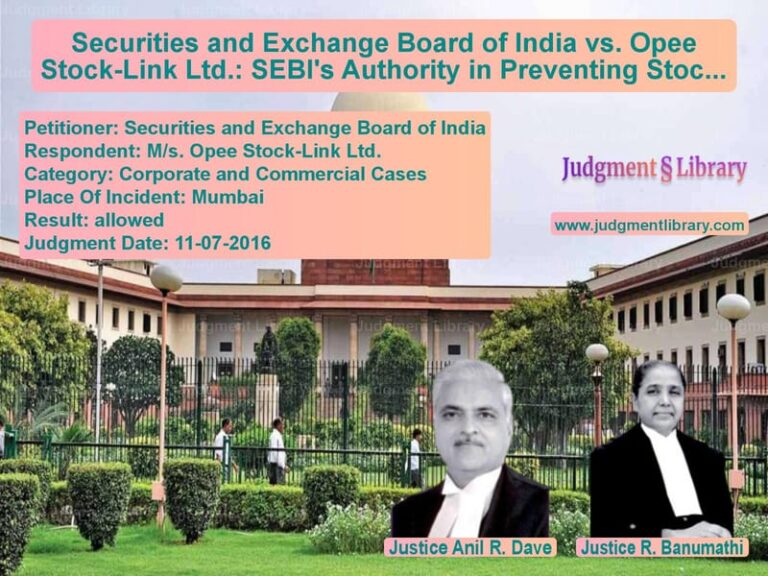Supreme Court Rules on Back Wages in TWAD Board Termination Case
The case of The Superintending Engineer, TWAD Board & Another vs. M. Natesan & Others revolves around the issue of termination of temporary workers and their entitlement to back wages. The Supreme Court had to determine whether the reinstatement of workers, who were engaged on a daily wage basis and later terminated, was justified, and to what extent they were entitled to back wages.
Background of the Case
Between 1986 and 1989, the respondents were employed as Store Watchmen on a daily wage basis in newly created Sectional Stores under the control of Rural Water Supply (RWS) Divisions, Nagercoil, under the TWAD (Tamil Nadu Water Supply and Drainage) Board. Their engagement order clearly stated that their employment was temporary and that they could not claim any right to permanent employment.
In 1990, the Board decided to close all Sectional Stores and form Divisional Stores at the district level. As a result, the services of these daily wage workers were terminated due to a lack of vacancies. The respondents challenged this termination and initiated an industrial dispute. When conciliation efforts failed, the matter was referred to the Labour Court, Madurai.
Labour Court’s Decision
The Labour Court ruled in favor of the workers, holding that their termination was invalid. It ordered their reinstatement with back wages and continuity of service. This decision was challenged by the TWAD Board before the Madras High Court.
Madras High Court Judgment
The learned Single Judge of the High Court observed that the workmen had not provided sufficient evidence to show that they had worked continuously for 240 days in a year. However, the judge also noted that the TWAD Board had not provided any records to counter this claim. The High Court upheld the Labour Court’s decision to reinstate the workmen but limited their back wages to 50%.
The TWAD Board, dissatisfied with this order, filed an appeal before the Supreme Court.
Key Legal Issues
- Was the termination of temporary workers justified under labor laws?
- Did the workers meet the requirement of working for 240 days to claim reinstatement?
- Was the grant of 50% back wages justified?
Arguments Presented
Petitioners (TWAD Board)
- The engagement order explicitly stated that employment was temporary, and the workers had no claim to permanent status.
- The formation of Divisional Stores necessitated closing the Sectional Stores, leading to the unavoidable termination of temporary workers.
- The burden of proving continuous service for 240 days lay on the workers, and they failed to produce any evidence.
Respondents (M. Natesan & Others)
- Their termination violated the principles of natural justice as they had worked for several years before being dismissed without proper notice.
- The TWAD Board had failed to produce any records to counter their claim of continuous employment.
- Even if their employment was temporary, fair labor practices required some form of compensation for their sudden termination.
Supreme Court’s Observations
1. Requirement of Continuous Service for 240 Days
The Court noted that under the Industrial Disputes Act, 1947, for a temporary worker to claim reinstatement, it must be proven that they worked continuously for 240 days in a given year. The Court observed:
“The burden of proving continuous service lies upon the workman. Only after this burden is discharged can the employer be required to provide records.”
The Supreme Court found that the respondents had not provided documentary evidence proving continuous service.
2. Reinstatement Not Feasible
The Supreme Court acknowledged that many of the respondents had reached the age of superannuation, making reinstatement impractical. It ruled that instead of reinstatement, monetary compensation should be provided in lieu of employment.
3. Back Wages Limited to 50%
The Court held that while some compensation was justified, full back wages were not warranted, considering the workers were engaged on a temporary basis. The Supreme Court upheld the High Court’s decision to grant 50% back wages.
Final Judgment
The Supreme Court ruled:
- Workers who had already received Rs. 2,00,000 as per interim orders shall retain that amount as part of their back wages and compensation.
- For workers who had passed away, the compensation would be paid to their legal heirs.
- The remaining amount deposited in courts was ordered to be refunded to the TWAD Board.
Implications of the Judgment
- Reaffirms that temporary workers must prove continuous service to claim reinstatement.
- Recognizes that in cases of prolonged litigation, reinstatement may not be feasible, and monetary compensation can be an alternative remedy.
- Ensures that fair labor practices are upheld while also protecting employers from unwarranted claims.
Conclusion
This judgment provides clarity on the legal position of temporary workers and their rights upon termination. While recognizing the hardships of the affected workers, the Supreme Court balanced their interests with those of the employer, ensuring that compensation was fair and legally justified.
Petitioner Name: The Superintending Engineer, TWAD Board & Another.Respondent Name: M. Natesan & Others.Judgment By: Justice R. Banumathi, Justice R. Subhash Reddy.Place Of Incident: Tamil Nadu.Judgment Date: 10-05-2019.
Don’t miss out on the full details! Download the complete judgment in PDF format below and gain valuable insights instantly!
Download Judgment: The Superintending E vs M. Natesan & Others Supreme Court of India Judgment Dated 10-05-2019.pdf
Direct Downlaod Judgment: Direct downlaod this Judgment
See all petitions in Employment Disputes
See all petitions in Termination Cases
See all petitions in Public Sector Employees
See all petitions in Judgment by R. Banumathi
See all petitions in Judgment by R. Subhash Reddy
See all petitions in allowed
See all petitions in supreme court of India judgments May 2019
See all petitions in 2019 judgments
See all posts in Service Matters Category
See all allowed petitions in Service Matters Category
See all Dismissed petitions in Service Matters Category
See all partially allowed petitions in Service Matters Category

